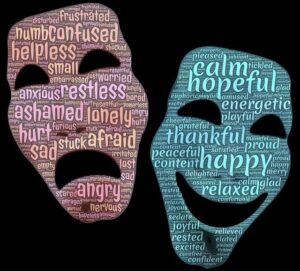Caveat: My notes from this Therapy Thursday session were pretty sparse & sketchy, so take nothing I say here as absolute truth. Nevertheless, there is still something to be gleaned from the session.
Two Minds
Have you ever hear the phrase, “I’m of two minds about something”? It means having two separate ideas or opinions about something and being undecided between the two.
From a psychological perspective, there is some truth to the concept of two minds- the emotional mind and the rational mind.
The Emotional Mind
The emotional mind, as you’ve probably guessed, is fueled by feelings. Its known for sparking creativity and inspiration, and tends to run hot, demonstrating both intensity and volatility.
Our emotional mind is the primary driver of our behavior, reflects our feelings and values, and often drives our actions.

When we utilize emotional reasoning, we tend to believe that our emotional reaction proves something is true (aka ’emotional truth’), even if evidence is to the contrary.
Feeling and longing are the motive forces behind all human endeavor and human creations.
Albert Einstein Tweet
- The Rational Mind
The rational mind uses logic and data to (carefully) make decisions. The rational mind responds well in a crisis, staying cool, putting emotions on the back burner and focusing on the situation needed resolution. Known for being pragmatic, the rational mind focuses on facts, not feelings and tends to be very task-oriented.
The Triune Brain
The triune brain reflects the three different sections of the brain- the reptilian, mammalian and human.
The Reptilian Brain

from PxHere
At our most primitive level, our reptilian or “lizard brain” focuses solely on survival. It runs on autopilot, without thought, often engaging our primary survival mode with a “coil & strike” response, (get them before they get you!). This primal response is even more primitive than the “fight, flight or freeze” we so commonly default too.
When we refer to urvical mode, we mean survival at all levels – food,
The Mammalian Brain
The mammalian brain, unique to mammals, is controlled by the limbic system, which is the center of learning and emotions.The limbic system modulates mood, memory, attention, and hormone control.
Our habits and attachments are driven by our limbic system.

“Human” / Neo-mammalian / Cerebral Cortex
I was reminded that it is our emotional mind that comes online first- quickly and easily beating out the rational mind. And our emotional mind tends to goes first to our reptilian reflex response – the coil & strike, which doesn’t bode well when it comes to conflict resolution…
Consequently, though our bodies may automatically go into reptilian response mode when feeling threatened in any way (emotionally, physically, etc.), we need to filter our responses through both our mammalian brain and human brains as well.
By using our Triune brain in tandem and concert with each other to work for our own good will generally result in the best possible outcome.














